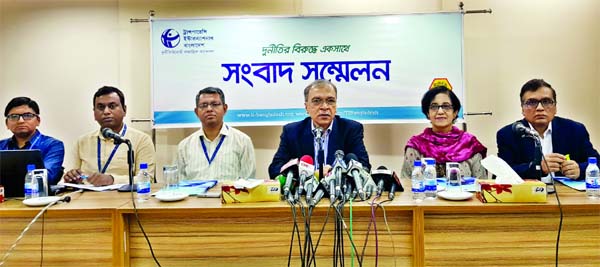
Staff Reporter :
Transparency International Bangladesh (TIB) has said even though there are mechanisms in place to ensure healthy environment, irregularities and corruption have led to the re-emergence of dengue.
TIB Executive Director Dr Iftekharuzzaman, in a research paper unveiling program on Aedes mosquito control and good governance in Dhaka city, said, irregularities and corruption are prevalent in every step of the procedures involved.
He said the rapid research that took one month to complete was done considering the dengue situation, an emergency health hazard.
The research was presented on Wednesday by TIB Deputy Program Managers (research and policy) Mostafa Kamal and Julkarnayeen.
They said that the research was based on secondary resources and focused on where the sort of irregularities and corruptions were prevalent, and what was barring the country in tackling the situation.
The research also tried to focus on measures that could be taken to bring the situation under control.
According to the researchers, destroying Aedes mosquitoes with the adulticide method was not the right approach,
as opposed to the more effective larvicide method.
Dr Iftekharuzzaman said, among the four approaches of controlling such types of diseases, the government preferred only the chemical-based control approach. In this approach, they need to procure materials that allow for scope, of corruption.
Dengue has spread all over Bangladesh owing to the lack of coordination among the organizations concerned in the mosquito eradication program. But instead of recognizing that, the authorities took an attempt to transfer the responsibilities on general people with imposition of fines, he said.
While explaining the irregularities and corruption inside city corporations, TIB said Dhaka South City Corporation (DSCC) breached The Public Procurement Rules, 2008.
Dockyard and Engineering Works Limited, Narayanganj (DEW Ltd) from whom both DNCC and DSCC ordered insecticides, is also not registered under Plant Protection Wing of the Agricultural Ministry, which has been made mandatory through Pesticide Act 2018.
Dr Iftekharuzzaman said DSCC paid around 40pc more than DNCC did earlier, some Tk 6.44 crore overpaid in purchase.
The researchers found that the company offered the same product to DNCC for Tk217 per litre, while DSCC paid Tk378 per litre for the same product.
They also claimed to find that half of the fogging machines in DNCC were malfunctioning in 2018, whereas, after buying new machines, 40 to 45 about machines still remain unusable. On the other hand, 428 fogging machines out of 940 of DSCC remain disorder.
The Institute of Epidemiology Disease Control and Research (IEDCR) lacks the standards set by the World Health Organization.
TIB Deputy Program Manager Julkarnayeen said, although IEDCR does not have the WHO directed support laboratory, they are running the examination with the same medicine for last 10 to 12 years.
“No examinations were done on city mosquitoes to find out if they have become resistant to these medicines,” he said.
Transparency International Bangladesh (TIB) has said even though there are mechanisms in place to ensure healthy environment, irregularities and corruption have led to the re-emergence of dengue.
TIB Executive Director Dr Iftekharuzzaman, in a research paper unveiling program on Aedes mosquito control and good governance in Dhaka city, said, irregularities and corruption are prevalent in every step of the procedures involved.
He said the rapid research that took one month to complete was done considering the dengue situation, an emergency health hazard.
The research was presented on Wednesday by TIB Deputy Program Managers (research and policy) Mostafa Kamal and Julkarnayeen.
They said that the research was based on secondary resources and focused on where the sort of irregularities and corruptions were prevalent, and what was barring the country in tackling the situation.
The research also tried to focus on measures that could be taken to bring the situation under control.
According to the researchers, destroying Aedes mosquitoes with the adulticide method was not the right approach,
as opposed to the more effective larvicide method.
Dr Iftekharuzzaman said, among the four approaches of controlling such types of diseases, the government preferred only the chemical-based control approach. In this approach, they need to procure materials that allow for scope, of corruption.
Dengue has spread all over Bangladesh owing to the lack of coordination among the organizations concerned in the mosquito eradication program. But instead of recognizing that, the authorities took an attempt to transfer the responsibilities on general people with imposition of fines, he said.
While explaining the irregularities and corruption inside city corporations, TIB said Dhaka South City Corporation (DSCC) breached The Public Procurement Rules, 2008.
Dockyard and Engineering Works Limited, Narayanganj (DEW Ltd) from whom both DNCC and DSCC ordered insecticides, is also not registered under Plant Protection Wing of the Agricultural Ministry, which has been made mandatory through Pesticide Act 2018.
Dr Iftekharuzzaman said DSCC paid around 40pc more than DNCC did earlier, some Tk 6.44 crore overpaid in purchase.
The researchers found that the company offered the same product to DNCC for Tk217 per litre, while DSCC paid Tk378 per litre for the same product.
They also claimed to find that half of the fogging machines in DNCC were malfunctioning in 2018, whereas, after buying new machines, 40 to 45 about machines still remain unusable. On the other hand, 428 fogging machines out of 940 of DSCC remain disorder.
The Institute of Epidemiology Disease Control and Research (IEDCR) lacks the standards set by the World Health Organization.
TIB Deputy Program Manager Julkarnayeen said, although IEDCR does not have the WHO directed support laboratory, they are running the examination with the same medicine for last 10 to 12 years.
“No examinations were done on city mosquitoes to find out if they have become resistant to these medicines,” he said.

